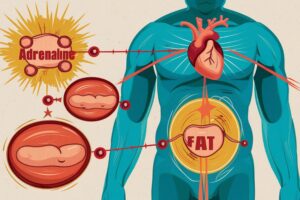The Link between Adrenal Stress Fat and Stubborn Belly Fat!
Chronic stress and stubborn belly fat are common health concerns that often go hand in hand, with the adrenal glands playing a crucial role in this intricate relationship. Understanding how adrenal stress impacts the accumulation of stubborn belly fat is essential for those striving to achieve optimal health and weight management.
This article delves into the mechanisms through which cortisol, the primary stress hormone, influences stubborn belly fat formation in the body, stress management strategies, nutritional considerations, and balanced lifestyle modifications in combating belly fat.
By addressing the root cause of adrenal imbalance, individuals can optimize their metabolic function and work towards a healthier body composition.

Table of Contents
ToggleUnderstanding the Connection Between Adrenal Stress and Belly Fat
Adrenal stress, also known as chronic stress, can have a significant impact on the accumulation of belly fat in individuals. When the body is constantly under stress, the adrenal glands release cortisol, a stress hormone, in response.
Cortisol plays a crucial role in the body’s fight or flight response, but when it is constantly elevated due to chronic stress, it can lead to an increase in belly fat. This is because cortisol promotes the storage of fat in the abdominal area, as opposed to other areas of the body.
In addition, high levels of cortisol can also lead to increased appetite, cravings for high-calorie foods, and a decrease in metabolism, all of which contribute to the accumulation of belly fat.
Furthermore, chronic stress can also have a negative impact on other hormones related to weight regulation, such as insulin and leptin. Insulin is responsible for regulating blood sugar levels and storing excess glucose as fat, while leptin helps to regulate hunger and metabolism.
When these hormones are thrown off balance due to chronic stress, it can further contribute to the accumulation of belly fat. Additionally, individuals who are chronically stressed may also engage in unhealthy coping mechanisms such as overeating, emotional eating, or lack of physical activity, all of which can exacerbate the problem.
Overall, the connection between adrenal stress and belly fat highlights the importance of managing stress levels in order to maintain a healthy weight and reduce the risk of chronic diseases associated with excess abdominal fat.
Read more about “The Impact of Arteriosclerosis on Cardiovascular Health”
What is Adrenal Stress and How Does It Affect the Body?
Adrenal stress is a condition that occurs when the adrenal glands, which are small glands located on top of the kidneys, become overworked and unable to effectively regulate the body’s stress response. This can happen when an individual experiences prolonged periods of stress or high levels of stress without adequate rest or recovery.
When the adrenal glands are in a state of chronic stress, they become depleted of the hormones they need to function properly, such as cortisol and adrenaline. This can lead to a number of physical and mental health issues, including fatigue, irritability, insomnia, weight gain, and weakened immune function.
The effects of adrenal stress on the body can be profound and wide-ranging. In addition to the physical symptoms mentioned earlier, adrenal stress can also contribute to the development of chronic illnesses such as hypertension, diabetes, and autoimmune disorders.
Furthermore, prolonged exposure to high levels of stress hormones can damage the cardiovascular system, disrupt the digestive system, and interfere with cognitive function.
By recognizing the signs of adrenal stress and taking steps to address it through lifestyle changes, stress management techniques, and potentially medication or supplements, individuals can mitigate the negative impact on their health and well-being.
Read more about “What is Phosphatidylcholine and it’s Essential Role in Cellular Health?”
Effects of Chronic Cortisol Elevation on Abdominal Fat
Chronic elevation of cortisol levels has been linked to an increase in abdominal fat accumulation. Cortisol is a hormone produced by the adrenal glands in response to stress, and plays a key role in regulating metabolism, immune response, and blood pressure.
However, when cortisol levels remain consistently high due to chronic stress, it can lead to the storage of excess fat in the abdominal region. This is because cortisol activates lipoprotein lipase, an enzyme that facilitates the storage of fat in adipose tissue, particularly in the abdominal area. Additionally, cortisol can also increase appetite and cravings for high-calorie foods, further contributing to the accumulation of abdominal fat.

The effects of chronic cortisol elevation on abdominal fat can have serious implications for overall health. Excess abdominal fat, also known as visceral fat, is associated with a higher risk of developing metabolic disorders such as diabetes, cardiovascular disease, and hypertension.
Furthermore, visceral fat is biologically active and releases inflammatory substances that can contribute to chronic inflammation in the body, further increasing the risk of various health conditions.
Therefore, managing stress levels and finding ways to reduce cortisol production through lifestyle changes, such as regular exercise, adequate sleep, and stress-reducing techniques like meditation and mindfulness, are crucial in preventing the harmful effects of chronic cortisol elevation on abdominal fat and overall health.
Read more about “What are the Causes and Symptoms of Amputation Disease and How to Treat?”
How Chronic Stress Can Lead to Stubborn Belly Fat Accumulation?
Chronic stress can lead to stubborn belly fat accumulation through a variety of physiological mechanisms. When the body is under stress, it releases cortisol, a hormone that plays a crucial role in metabolism regulation.
Elevated levels of cortisol can increase appetite and promote the storage of fat, especially around the abdominal area. Additionally, chronic stress can lead to poor dietary choices and emotional eating, which further contribute to weight gain in the midsection.
Furthermore, continual stress can disrupt sleep patterns and lead to hormonal imbalances, such as insulin resistance, which can also contribute to the accumulation of belly fat.
To combat this issue, it is essential to incorporate stress-reducing activities into your daily routine, such as mindfulness practices, exercise, adequate sleep, and healthy eating habits. By addressing chronic stress effectively, individuals can better manage their weight and reduce stubborn belly fat accumulation.
Read more about “What are the Causes and Symptoms of Gangrene Disease and How to Treat?”
The Connection Between Adrenal Health and Metabolism
Adrenal health and metabolism are closely intertwined, as the adrenal glands play a critical role in regulating metabolism. The adrenal glands produce hormones such as cortisol, which helps to regulate blood sugar levels, metabolism and immune function.
When the adrenal glands are not functioning optimally, it can lead to imbalances in these hormones, which can in turn impact metabolism. For example, chronic stress can lead to increased cortisol levels, which can disrupt metabolism and lead to weight gain and other metabolic issues.
Furthermore, adrenal health can also influence thyroid function, another key player in metabolism regulation. The adrenal glands and thyroid gland work closely together to ensure the body’s metabolism is functioning properly.
If the adrenal glands are not functioning optimally, it can impact thyroid function, leading to a slowdown in metabolism and weight gain. Therefore, maintaining optimal adrenal health is crucial for overall metabolic function.
Strategies such as stress management, adequate sleep, and a balanced diet can help support adrenal health and in turn, promote a healthy metabolism.
Strategies for Managing Adrenal Stress to Reduce Belly Fat
Managing adrenal stress is crucial for reducing belly fat, as the body’s response to stress can lead to an increased production of cortisol, a hormone that promotes the storage of fat in the abdominal region.
One effective strategy for managing adrenal stress is to engage in regular exercise, which can help to reduce cortisol levels and improve overall physical and mental health. Exercise can also help to release endorphins, which are natural mood boosters that can help to combat the negative effects of stress on the body.

In addition to exercise, practicing relaxation techniques such as deep breathing, meditation, and yoga can help to lower cortisol levels and promote a sense of calm and well-being.
It is also important to prioritize sleep and ensure that you are getting enough rest each night, as insufficient sleep can contribute to increased stress levels and weight gain. Making healthy dietary choices, such as consuming foods rich in antioxidants and avoiding processed foods and sugar, can also help to reduce stress and promote weight loss.
By implementing these strategies for managing adrenal stress, individuals can work towards reducing belly fat and improving their overall health and well-being.
The Importance of a Healthy Diet and Exercise in Combatting Belly Fat
Maintaining a healthy diet and regular exercise routine are imperative in combatting belly fat due to their combined impact on reducing overall body fat percentage and visceral fat accumulation.
A diet rich in whole foods, such as fruits, vegetables, lean proteins, and whole grains, provides essential nutrients and fiber that aid in digestion and metabolism. Additionally, consuming fewer processed foods high in sugar and unhealthy fats can prevent excess calorie consumption that often leads to weight gain specifically in the abdominal area.
Pairing a balanced diet with consistent physical activity, such as cardiovascular exercises and strength training, helps to increase muscle mass and boost metabolism, further aiding in fat loss.
Moreover, engaging in regular exercise promotes the burning of calories during workouts while also triggering long-term metabolic changes that support weight management. By committing to both aspects of a healthy lifestyle, proper nutrition and regular exercise, individuals can effectively combat belly fat and improve overall health.
Importance of Lifestyle Changes That Can Help Reduce Cortisol Levels
Reducing cortisol levels through lifestyle changes is crucial in maintaining overall health and well-being. High levels of cortisol, often referred to as the stress hormone, can have detrimental effects on the body including increased risk of heart disease, obesity, and mental health issues.
By incorporating healthy habits such as regular exercise, adequate sleep, mindfulness practices, and a balanced diet rich in whole foods and nutrients, individuals can effectively lower cortisol levels and manage their stress response.
Additionally, engaging in activities that promote relaxation and self-care such as yoga, meditation, or spending time in nature can further help mitigate the harmful effects of chronic stress on the body. Making these lifestyle changes not only reduces cortisol levels but also improves overall quality of life and resilience to future stressors.
Dietary Recommendations for Balancing Cortisol Levels
One key dietary recommendation for balancing cortisol levels is to focus on consuming a well-balanced diet that is rich in nutrient-dense foods. This involves usage of a mix of fruits, vegetables, whole grains, lean proteins and healthy fats in your meals.
These foods provide essential vitamins, minerals, and antioxidants that can help support your body’s stress response and regulate cortisol levels. Additionally, it is important to limit the intake of processed foods, refined sugars, and caffeine, as these can disrupt the delicate balance of cortisol in the body.
Another important dietary recommendation for balancing cortisol levels is to eat regular meals throughout the day and avoid skipping meals or engaging in restrictive diets.
Irregular eating patterns can lead to spikes and crashes in blood sugar levels, which can in turn impact cortisol levels. By eating balanced meals at consistent times, you can help regulate your body’s natural cortisol rhythm.
It is also helpful to include foods that are high in fiber and protein, as these can help stabilize blood sugar levels and reduce cortisol spikes. Overall, by following a nutritious and balanced diet, you can support your body’s ability to manage stress and maintain healthy cortisol levels.
Types of Exercise that Promote Stress Reduction and Weight Loss
Physical exercise is a crucial component of a healthy lifestyle, with a multitude of benefits for both physical and mental well-being. There are various types of exercise that can effectively reduce stress levels and aid in weight loss.
Aerobic exercises such as running, swimming and cycling have been shown to have a positive impact on reducing stress by increasing the production of endorphins, which are known as the “feel-good” hormones.
These exercises also improve cardiovascular health, which can help in managing stress and reducing the risk of chronic diseases. In terms of weight loss, incorporating strength training exercises such as weightlifting and bodyweight exercises can increase muscle mass and boost metabolism, leading to more effective fat burning and weight loss.
Additionally, mind-body exercises such as yoga and Tai Chi have gained popularity for their stress-reducing benefits. These exercises promote relaxation, mindfulness, and deep breathing techniques that can help lower cortisol levels, the hormone associated with stress.
Mind-body exercises also improve flexibility, balance, and overall physical function, contributing to a holistic approach to stress reduction and weight loss. It is important to incorporate a variety of exercises into a fitness routine to reap the full benefits of stress reduction and weight loss.
By understanding the different types of exercises and their specific benefits, individuals can tailor their workout regimen to achieve their health and wellness goals effectively.
The Link Between Sleep and Cortisol Levels in the Body
Cortisol is a hormone produced by the adrenal glands that plays a crucial role in regulating stress responses and the body’s metabolism. One of the key factors that influence cortisol levels is sleep. Studies have shown that sleep deprivation can lead to elevated cortisol levels in the body.
When we do not get enough sleep, our bodies go into a state of stress, causing cortisol levels to rise. This can have a cascading effect on our overall health, as chronically elevated cortisol levels have been linked to a number of health issues, including weight gain, diabetes and heart disease.
On the flip side, getting a good night’s sleep can help regulate cortisol levels and reduce stress in the body. During the deep stages of sleep, our bodies undergo important repair and restoration processes that help balance hormone levels including cortisol.

By prioritizing good sleep habits, such as maintaining a consistent sleep schedule, creating a relaxing bedtime routine, and practicing good sleep hygiene, we can help ensure that our cortisol levels stay within a healthy range. Ultimately, the link between sleep and cortisol levels highlights the importance of prioritizing sleep as a key component of overall health and well-being.
Conclusion:
In conclusion, addressing adrenal stress and its connection to stubborn belly fat requires a holistic approach that encompasses stress management techniques, lifestyle modifications, and targeted interventions. By prioritizing self-care, making mindful choices in diet and exercise, and seeking support when needed, individuals can take proactive steps towards achieving their weight loss goals and improving their overall well-being.
Embracing a balanced approach to addressing adrenal stress and stubborn belly fat can pave the way for lasting health benefits and a more resilient body and mind.
FREQUENTLY ASKED QUESTIONS
1. How does chronic stress contribute to stubborn belly fat?
Chronic stress can directly contribute to the accumulation of stubborn belly fat through various physiological pathways. When individuals are under chronic stress, the body releases higher levels of cortisol, a stress hormone that signals the body to store fat for potential energy needs. Elevated cortisol levels have been linked to increased visceral adiposity, particularly in the abdominal region, as this is where cortisol receptors are most prevalent.
Furthermore, chronic stress can lead to poor dietary habits and lack of physical activity, which further exacerbate weight gain in the abdominal area. Moreover, consuming high-calorie comfort foods due to stress, such as emotional eating or binge eating, can lead to consuming excess calories and ultimately result in weight gain, particularly in the midsection. Addressing chronic stress through coping mechanisms such as exercise, mindfulness practices, or therapy can help prevent the accumulation of stubborn belly fat associated with prolonged periods of stress.
2. Are there specific exercises that can help reduce cortisol levels and target belly fat?
There is evidence to suggest that certain exercises can help reduce cortisol levels and target belly fat. High-intensity interval training (HIIT) has been shown to effectively decrease cortisol levels in the body, as it helps regulate the stress response and improve overall metabolic function. Additionally, exercises that focus on core strength such as planks, Russian twists, and bicycle crunches can help tone and tighten the abdominal muscles, reducing the appearance of belly fat.
Moreover, incorporating activities like yoga or Pilates into a fitness routine can also assist in lowering cortisol levels through their emphasis on mindfulness and relaxation techniques. Ultimately, a combination of aerobic exercise, strength training, and flexibility exercises can be most effective in both reducing cortisol levels and targeting belly fat for a more holistic approach to health and fitness.
3. Can dietary changes alone improve adrenal health and reduce belly fat?
Dietary changes can play a significant role in improving adrenal health and reducing belly fat. Adrenal health is closely linked to our body’s stress response, and a diet rich in nutrient-dense foods can help support the adrenal glands’ proper functioning. Incorporating foods high in antioxidants, such as colorful fruits and vegetables, can help reduce inflammation and oxidative stress on the adrenal glands. Additionally, consuming healthy fats like those found in avocados and nuts can support hormone production and balance, which is crucial for maintaining a healthy weight.
By avoiding processed foods high in sugar and refined carbohydrates, individuals can prevent spikes in blood sugar levels that can contribute to abdominal weight gain. Overall, while dietary changes alone may not be a cure-all for adrenal issues or belly fat reduction, focusing on a balanced and nutritious diet can certainly have a positive impact on both aspects of health.
4. When should one seek professional help for managing adrenal stress and stubborn belly fat?
Individuals should seek professional help for managing adrenal stress and stubborn belly fat when they have tried multiple lifestyle changes and home remedies without seeing significant improvement. Symptoms of adrenal stress, such as fatigue, anxiety, and weight gain, can significantly impact overall well-being and quality of life if left untreated. Additionally, stubborn belly fat can be a sign of hormonal imbalance or other underlying health issues that may require medical intervention.
A healthcare provider specializing in endocrinology or holistic medicine can offer a comprehensive assessment to identify the root cause of these issues and develop a personalized treatment plan. Seeking professional help early on can prevent further complications and lead to better long-term health outcomes.


